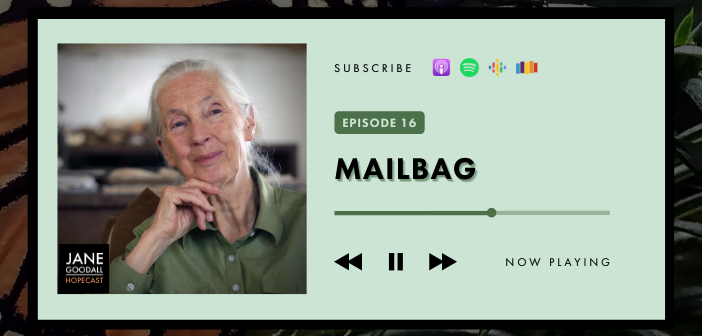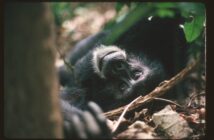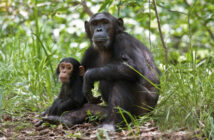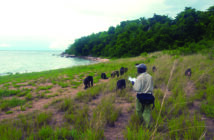FULL TRANSCRIPT
Jane Goodall 0:03
CONSERVATION CHOIR: Together we can achieve more. When we foster our relationship with animals it allows our survival. She is unwavering in her mission and has proven that one person can unite others. I aspire to change the world, too, because of the hope she gave me. She devoted her life to it. Together we can save the world. Together we can, together we will. What is your greatest reason for hope? I’m Jane Goodall. And this is the Hopecast.
Hello, everyone, I want to welcome all of you to the very last mailbag episode of our first season of the Hopecast. The first but not the last. I also want to introduce Anna Rathmann, the almost brand new executive director of the Jane Goodall Institute, USA. A very special person, indeed. So huge welcome to you, Anna.
Anna Rathmann 1:04
Thank you, Jane. It’s such a pleasure to be here. And it’s such an honor to be a part of JGI. Since joining the team and having the opportunity to meet the team, both domestically within the United States, but all over the world, it has been nothing short of a privilege to get to work with them. I’m constantly inspired by the global nature of your work. And it’s just a joy to be a part of it.
Jane Goodall 1:34
Well, we’re equally glad to have you as a part of it. So welcome on two fronts to JGI and to the Hopecast.
Anna Rathmann 1:42
Thank you, I’ve loved listening. And Jane, I’m especially excited to be on this episode, the last of the mailbag episodes for season one. It’s been quite a season, it’s had extraordinary reach, you have had extraordinary reach through the Hopecast. I’m curious if you could take a minute to share with the Hopecast community about how all of our lives have changed, but yours prior to COVID, you were traveling the world. I’ve often heard 300 days a year. COVID grounded all of us, and yet now you reach over 130 countries a month through the Hopecast. I’m curious what that’s meant to you.
Jane Goodall 2:28
It’s been extraordinary how virtual Jane has managed to reach out to literally millions more people, and then many more countries than if I was touring. These Hopecasts, I’m amazed at how successful they’ve been. To me, this is extraordinary.
Anna Rathmann 2:46
It’s amazing. I think there’s something that was so amazing about the timing of all of this and your message of hope. And in a world that we were all collectively going through, it was uncertainties and change constantly. The message of hope that you brought to the world through this, it was so needed.
Jane Goodall 3:06
Yes and also pointing out that basically, if we don’t create a new kind of relationship with nature and animals, there’ll be more pandemics. We have to make change. And I thought this is a wake up call to start doing things differently for the sake of the future.
Anna Rathmann 3:25
Jane, you and I also have a shared love of a certain someone’s quotes. And we’ve talked about one of them. This is from Winston Churchill: “A pessimist sees the difficulty in every opportunity. An optimist sees the opportunity in every difficulty.” And that seems very apropos for the world in which we’re living now.
Jean, I just think it’s extraordinary the reach that you’ve had, through the Hopecast. How your message of hope, of optimism has resonated around the world. It’s evident in the messages that we received. And in fact, the first one here is from Myanmar.
Hopecaster 1 4:18
Hello, my name is Mimi. I’m from Myanmar. And I believe that the key to stopping environmental crisis starts with giving passionate people, regardless of their demographics, the platform and mentorship to further implement their vision for positive change. One word that I will describe my role for this planet is activist. And I wish to see change in global conscience of animals sanctions, which I believe impacts the overall action for their welfare, protection and also their habitats. Dr. Jane inspired me through perseverance in the face of adversity by putting in all our heart and drive for our own passions. And with that, have been an activist for not just animals, but people in need as well. Valuing the importance of equity and empathy for all. And with that, one word I would use to describe our planet is family. Thank you very much.
Jane Goodall 5:14
Thank you Mimi, for that nice message. And that’s the whole point of doing things like these Hopecasts is to try and inspire people, and help people understand that every single one of us makes a difference every single day. And we get to choose what sort of difference we make. So I’m really happy that you’ve got this attitude towards how you personally can make a difference.
Anna Rathmann 5:40
I think what is really special about that first message was this idea of taking action. And that’s something, Jane, that I’ve heard you talk a lot about, I know it’s something that is woven into the fabric of JGI. And it’s that inspiring hope through action. It’s just a beautiful aspect of what is a part of JGI and your vision and mission for our work. The next mailbag entry comes from a biologist in the United States.
Hopecaster 2 6:14
My name is Dr. Arpita Kulkarni, and I’m a biologist at Harvard University. The one word I would use to describe a planet is ours. We need to act as one in our efforts to improve the lives of people, animals and the environment. It gives me great hope to see that many women and minorities are choosing STEM fields, and are actively stepping into leadership roles to make a difference to the future of our planet. Dr. Goodall gives us hope that every individual matters. I believe that fostering diversity, equity, inclusion and belonging for all people at the global discussion table, is the only way to prevent any future environmental crisis. And this is the change I want to see in the world. We are all connected, all our voices matter. And it will take all of our bold talents and strengths to create a healthier planet that is in harmony.
Jane Goodall 7:02
Well, thank you very much for that message, Dr. Kulkarni. And I couldn’t agree with you more. You know, it was out in the rain forest in Tanzania, when I was studying the chimpanzees that I learned how everything was interconnected. And every species no matter how small, had a role to play in this glorious tapestry of life. And it’s like that with we human beings on planet Earth. We all have a role to play, even if we don’t know it yet. And it’s when we all get together, playing our part to make this a better world. And what I love is a saying by one of the tribal cheifs in Latin America, he said to me, Jane, I see our tribe as like an eagle, and one wing is male, and the other wing is female. And only when the two wings are equal, will our tribe fly high. And that’s what I want to see. And that’s what we encourage in our program for young people Roots and Shoots. So I couldn’t agree with you more.
Anna Rathmann 8:08
I love that Jane, too. Roots and Shoots is a program that’s inspiring young people the world over and having extraordinary ripple effects in their communities, but then far beyond that into the global community. I loved what Dr. Kulkarni said as well about all our voices matter. And that’s something that’s really beautiful about these mailbag episodes, is getting to hear the voices of the Hopecasters. Our next mailbag submission came via text. So I’m going to read this to you. Kathy writes in from Tanzania, quote, our rural village in Zizi, Tanzania was plunged into further extreme poverty. When our land was degrading due to climate change and bad agricultural practices. We rely on our agriculture but struggled to grow anything. Our climate changed, and we often faced droughts. We became hungry as we didn’t have food to eat, and we had to get water from dirty ponds shared with animals. Stunting of growth wasn’t uncommon in our children due to lack of food. But we have hope. We are growing things again, crops, beautiful sunflowers, many more trees to help the earth. We are training people in agricultural practices in climate education. So we can take climate action collectively as a community and stop practices such as slash and burn. We are getting water to the village which is also helping us grow crops through our irrigation systems. We are growing more food and earning more money. We may still be in extreme poverty, but as we lift ourselves out of it, we are taking care of the earth and educating others for a better future for all of us.
Jane Goodall 10:09
Well, Kathy, thank you for that. And it sounds very much like our Jane Goodall Institute program, Take Care or TACARE. And it would be wonderful if we could collaborate and share your knowledge with our people and our people’s knowledge with yours. And you’re so right that Tanzania like many other countries in southern Africa, are suffering greatly from climate change. The droughts are getting worse. And in some places, the flooding is getting far, far worse. In the part of Tanzania where I live when I’m there, in Dar es Salaam, Lake Tanganyika has risen. That’s where Gombe National Park is. There has been enormous change. And moving back to the ways practiced by African farmers for generations, is really beginning to make a huge difference. Moving away from the monocultures imposed by Western agriculture, which is not suitable for Africa. In fact, with its use of pesticides and herbicides, and too much fertilizer, it’s not really good anyway, it’s destroying the land. So I’m really glad to hear about your program. And I do hope that we can collaborate and get together. Together, we can make even more difference. So I love what you’re doing. Thank you so much for sending in this message.
Anna Rathmann 11:41
Jane, you mentioned TACARE, and TACARE is one of those examples, too, of working with local communities and understanding agricultural practices and helping fit to the needs of the local communities. That’s something that JGI has been involved in for years and through your vision and leadership. And it’s, it’s a wonderful, wonderful example of working with local communities to find solutions.
Jane Goodall 12:06
Yes, it really has been incredibly successful. TACARE began in 12 villages with a group of local Tanzanians going into the villages and asking the people what they thought we could do to help. And it’s been so successful. It’s now in 104 villages throughout almost all chimpanzee range in Tanzania. And the people are our partners in conservation, because they understand that protecting the environment is not just for wildlife, it’s for their own future good. And that program is now in six other African countries.
Anna Rathmann 12:52
Our next submission is from a young person. You mentioned Roots and Shoots earlier, and roots and shoots is one of these wonderful programs that is engaging young people all over the world. This young person is calling in from Japan.
Hopecaster 3 13:10
Hello, Dr. Bell, my name is Yuri Chae. I’m a high school student living in Japan. I do not have any dream yet. But when I find my dream, which can make me feel useful in the future, even if people around me love and complain about my dream, I pledge that I will make up my mind, I can do it. And I keep in mind that I’m going to looking for the way to achieve my dream. Also, it maybe difficult for me to achieve my dream but I thought that I have to believe I have hidden potential. And I should make an effort after reading your essays. Thank you so much.
Jane Goodall 13:51
Oh, Yuri, that is such a lovely message. Thank you so much. And it’s wonderful to hear that this message resonated with you and gave you more hope for your own future. All I can do is to wish for you courage and strength to stand up for what you believe in and do what you know will make you happy and be good for the planet. So thank you so much for that message.
Anna Rathmann 14:18
The next mailbag submission is from another young person. And you will, I think, enjoy this because they have taken the initiative to educate and engage others around them, despite being a young person.
Hopecaster 2 14:37
Hi, Dr. Goodall, my name is Nyla Hayhoe and I’m 13 years old. I wanted to thank you for everything you do. You have paved the way for so many young people, showing us with passion and dedication, we can do anything. When I was little, I watched one of your documentaries and it really opened my eyes to what our relationship with nature and animals should be. Many years later, I’ve gained the courage to follow your example and choose to care. I’ve started a webinar series and it’s titled “Dolphins Always Know Best,” and each month, I’ll be joined by a lineup of experts to discuss the climate crisis and push action through knowledge. Thanks to you, I’ve had the courage to do what I was sure was impossible. So thank you. I hope that one day I’ll be able to meet you. Bye.
Jane Goodall 15:20
Well, Nyla, thank you for that. And, of course, we’ll meet each other one day. And we might even be able to give ourselves a hug instead of an elbow. But I love your message. And I really congratulate you on your young age, for starting a Hopecast of your own. And talking to people about how we can get together and tackle climate change together create a new way forward, a post COVID world. So thank you and good luck.
Anna Rathmann 15:53
This next one is someone else who is inspired by hearing some of your words, Jane.
Hopecaster 4 16:02
I believe that anyone can make a difference simply by taking small steps every day, eating less meat, recycling, and avoiding single use plastics. My one word role in bettering our planet is activist. I want people to care more about climate change, because it affects us all. Jane is my idol and inspires me to speak up for those who cannot speak for themselves, as she once said. I stopped eating meat two years ago, and I recycle a lot. The one word I would use to describe our planet is home. And it is our responsibility to take care of it rather than destroyed.
Jane Goodall 16:42
Well, thank you, Samuil, for that message. It’s so encouraging to hear the number of people who want to get together and become activists on behalf of poor old Planet Earth. It’s our only home, and we have to stop destroying it. And what gives me hope to carry on is hearing from people like you, knowing that there’s a groundswell of young people and older people working together for a better future. So thank you very much for sending in that comment.
Anna Rathmann 17:17
This next submission is coming from a teacher. We’ve heard from students. And now we’ll hear from a teacher.
Hopecaster 5 17:27
Hi, Jane. My name is Craig and I’m calling in from Ontario, Canada. Peterborough, Ontario. And I just wanted to take a second to say thank you. You always provide hope and inspiration, and ideas and guidance, too, for how we can make a difference. Your words have always struck a deep chord with me. So many times over the years, I found myself shedding a tear just being moved by, by what you have to say. And your message that each one of us can make a difference is just so important. I work at an environmental education center. And I’m lucky to work in a beautiful place taking kids into nature, we try and pass some of that on. Thanks.
Jane Goodall 18:10
Teachers are so important. Good teachers are the salt of the earth. And in our program for young people Roots and Shoots, we totally rely on teachers. But it would be wonderful if perhaps we can collaborate and you can join our Roots and Shoots program, as well. The more we get together as a family, the better we can fight discrimination and the better we can all work as one to improve the health of our poor old planet Earth. We’ve just got to find a new way forward, and teachers play a really important part in educating the youth.
Anna Rathmann 18:51
Our final mailbag submission for this, the first season of the Hopecast, is someone very special. Not only is she a Roots and Shoots member, but she was named a heroine of Roots and Shoots in Spain. She’s calling in from Barcelona, Spain, where she describes herself as an animal rights activist and a climate warrior.
Hopecaster 6 19:16
Hi, my name is Olivia Mandel. I’m 13 years old from Barcelona, Spain. I’m an animal rights activist and a climate warrior. I dream of plastic free oceans and I dream of a world where no animals are in captivity. My dream is to create a dolphin and marine Animal Sanctuary in the Mediterranean. I have a campaign on Change.org to ask the Spanish government to end dolphin parks in Spain, which has more than 56,000 signatures. Dear Dr. Goodall, I’m pretty sure you know how much you inspire me and young people around the world. But I just want to tell you from the bottom of my heart, thank you. You’re more than an inspiration. You’re the voice of hope.
Jane Goodall 19:59
Well, thank you for that, Olivia. And you may say, I’m your hope. But let me tell you, you are my hope. And it’s wonderful to talk to one of the many heroines from Spain. And I’m so happy that you’re part of our Roots and Shoots program. Your plans for making this a better world, your activism, it’s all giving me great hope. You’re one of many around the world. And that’s what’s needed to move us into a better future. So thank you, and I hope that we meet one day.
Anna Rathmann 20:34
I couldn’t agree more with you, Jane. Hearing from young people, like we did on this mailbag episode, they’re the future. And the future is very bright. When you hear of young people like Olivia, who are drawing inspiration from you and your work, and gathering together to make a difference for our world.
Jane Goodall 20:55
On this particular mailbag, there have been so many young activists, it’s really, really encouraging and from these different countries. And that, of course, has been one of the great values of the Hopecast, I have been able to reach into so many countries, places where I wouldn’t have gone on tour. So there has been a big silver lining, to being grounded at home in England.
Anna Rathmann 21:22
It’s just wonderful. And we have a big announcement now looking forward to the next season to season two of the Hopecast, that this will not be the end. This is just the beginning. And season two is going to come just in time for World chimpanzee day, which we all know, is July 14. Season two of the Hopecast will launch just the day before on July 13. What kind of impact are you hoping that this second season will have?
Jane Goodall 21:55
Well, all I can hope is that people won’t be bored with Jane. And that they’ll continue to listen, because it’s having an effect that’s going to help the planet forward. And it’s inspiring people. It’s giving people hope. And you know, I always say without hope, you won’t take action, because if you don’t believe that your action is going to be useful, why would you bother? So once you take action, then you get more hope, because you see it works. And then other people are inspired by your actions and your hope and it spreads. And so it’s very exciting to think that this isn’t the end, that we’ll have more opportunities to reach yet more people in more countries that we truly have made a difference.
Anna Rathmann 22:46
It’s just wonderful. The other thing to mention too, world chimpanzee day, for those who don’t know this, was chosen because it was the day that Jane started her work in Gombe, Tanzania, and we are now celebrating over 60 years of that research, the extraordinary groundbreaking research of the Gombe chimpanzees. Thank you, Jane, for inspiring all of us. Thank you for the work that you have started, and your mission and vision through the Jane Goodall Institute. And thank you for letting me join you on this, the final episode of season one. The changes that the Hopecast has already made and what it’s going to do in the future is such a source of optimism for all of us.
Jane Goodall 23:32
Well, thank you, Anna, and I must say that the Hopecast is a wonderful way of spreading these messages. So I’m really looking forward to what’s going to come during the next season. Thank you everybody who’s been listening. I hope that you will stay with us and join us again for season number two.
Feel hopeful and inspired to act with a Jane Goodall Hopecast by subscribing on Apple podcasts, Spotify, Stitcher, Google Podcasts, and anywhere podcasts are found. I’m your host, Jane Goodall. The Jane Goodall Hopecast is produced by the Jane Goodall Institute. Our production partner is FRQNCY Media. Michelle Khouri is our executive producer, Enna Garkusha is our producer, and Matthew Ernest-Filler is our editor and sound designer. Our music is composed and performed by Ruth Mendelssohn with additional violin tracks from Angie Shear. Sound design and music composition for the Conservation Chorus is by Matthew Ernest-Filler.

The Jane Goodall Institute is a global community conservation organization that advances the vision and work of Dr. Jane Goodall. By protecting chimpanzees and inspiring people to conserve the natural world we all share, we improve the lives of people, animals and the environment. Everything is connected—everyone can make a difference.









